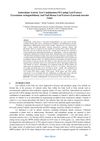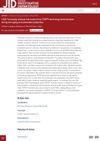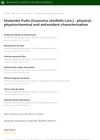 1 citations,
August 2021 in “International journal of cosmetic science (Print)”
1 citations,
August 2021 in “International journal of cosmetic science (Print)” Using piroctone olamine on the scalp helps reduce hair loss and improves scalp health.
[object Object] 1 citations,
April 2022 in “Applied sciences” Bitter melon extract may help prevent hair loss and can be used in cosmetic products.
 1 citations,
February 2022 in “International Journal of Health and Pharmaceutical (IJHP)”
1 citations,
February 2022 in “International Journal of Health and Pharmaceutical (IJHP)” Combining cantigi and henna leaf extracts boosts antioxidant activity.
 1 citations,
October 2021 in “Bioactive compounds in health and disease”
1 citations,
October 2021 in “Bioactive compounds in health and disease” Hibiscus anthocyanins help protect the liver and improve antioxidants in diabetic rats.
1 citations,
September 2021 in “Pharmaceutics” High-dose finasteride may help treat glioblastoma but needs localized delivery for effectiveness.
1 citations,
April 2014 in “Dong-ui saengni byeongni hakoeji/Dong'ui saengli byeongli haghoeji” Samhwang-Sasimtang extract may promote hair growth and act as a natural hair growth agent.
[object Object] April 2024 in “Molecules/Molecules online/Molecules annual” Paris polyphylla saponins may effectively treat acne due to their antibacterial and anti-inflammatory properties.
 April 2023 in “Journal of Investigative Dermatology”
April 2023 in “Journal of Investigative Dermatology” Terminalia chebula fruit extract has strong anti-aging and antioxidant effects.
 February 2023 in “Materials Express”
February 2023 in “Materials Express” Pine pollen extract helps wounds heal faster due to its antioxidant and anti-inflammatory effects.
 January 2023 in “Han'gug mi'saengmul saengmyeong gong haghoeji/Han-guk misaengmul saengmyeong gonghak hoeji”
January 2023 in “Han'gug mi'saengmul saengmyeong gong haghoeji/Han-guk misaengmul saengmyeong gonghak hoeji” NOC-4 extract promotes black hair and hair growth effectively.
 November 2024 in “International Journal of Cosmetic Science”
November 2024 in “International Journal of Cosmetic Science” Botanical extracts can improve scalp health by reducing oxidative stress.
 August 2024 in “Frontiers in Nutrition”
August 2024 in “Frontiers in Nutrition” Antioxidant-rich diets may reduce hair loss risk, while pro-inflammatory diets may increase it, especially in women.
 June 2024 in “Molecules/Molecules online/Molecules annual”
June 2024 in “Molecules/Molecules online/Molecules annual” Platycladus orientalis flavonoids protect balding hair from UV damage and slow hair color change.

Younger goats produce more cashmere and have healthier hair follicles due to better antioxidant capacity.
 September 2023 in “Cumhuriyet science journal”
September 2023 in “Cumhuriyet science journal” Myrtle essential oil has a higher antioxidant capacity than orange essential oil.
 May 2023 in “Antioxidants”
May 2023 in “Antioxidants” Peptides from oysters may safely and effectively heal skin wounds with less scarring.

The hydrogel helps skin heal faster and better than a commercial dressing by creating a protective environment and supporting new blood vessel and hair growth.
Lablab purpureus peptides may effectively kill cancer cells with fewer side effects.
September 2022 in “The Korean Tea Society” Houttuynia cordata compounds may help with anti-aging and hair loss.
 March 2022 in “Osmangazi tıp dergisi”
March 2022 in “Osmangazi tıp dergisi” Acne patients have higher levels of oxidative stress, but it's not clear if it causes or results from acne; antioxidants might help treat acne.
 May 2021 in “Boletín latinoamericano y del Caribe de plantas medicinales y aromáticas”
May 2021 in “Boletín latinoamericano y del Caribe de plantas medicinales y aromáticas” Microsechium helleri extract has antioxidant, anti-inflammatory, antidiabetic, and heart-protective benefits.
 May 2020 in “Research, Society and Development”
May 2020 in “Research, Society and Development” Mutamba fruits are rich in soluble solids, vitamin C, and minerals, making them good for food industry use.
 April 2018 in “Journal of Investigative Dermatology”
April 2018 in “Journal of Investigative Dermatology” Mint water extract boosts protective enzymes in skin cells.
 December 2017 in “Dong-ui saengni byeongni hakoeji”
December 2017 in “Dong-ui saengni byeongni hakoeji” Cynanchi Wilfordii Radix has strong antioxidant effects and may help treat male hair loss.

Mealworm extract may help prevent hair loss and promote hair growth due to its antioxidant activity.
Some Himalayan plants with higher antioxidant activity can promote hair growth better.
December 2021 in “Egyptian Journal of Dermatology and Venereology” Oxidative stress may worsen female pattern hair loss and could help track the disease and treatment.
75 citations,
February 2017 in “Aging” SkQ1 antioxidant improved health and lifespan in mice.
 May 2024 in “Journal of drug delivery and therapeutics”
May 2024 in “Journal of drug delivery and therapeutics” Women with PCOS have higher oxidative stress and hormone imbalances, suggesting managing oxidative stress could help.
 October 2023 in “Arab Gulf journal of scientific research”
October 2023 in “Arab Gulf journal of scientific research” The powder shampoo with cinnamon extract has strong antioxidant properties and is eco-friendly.





















